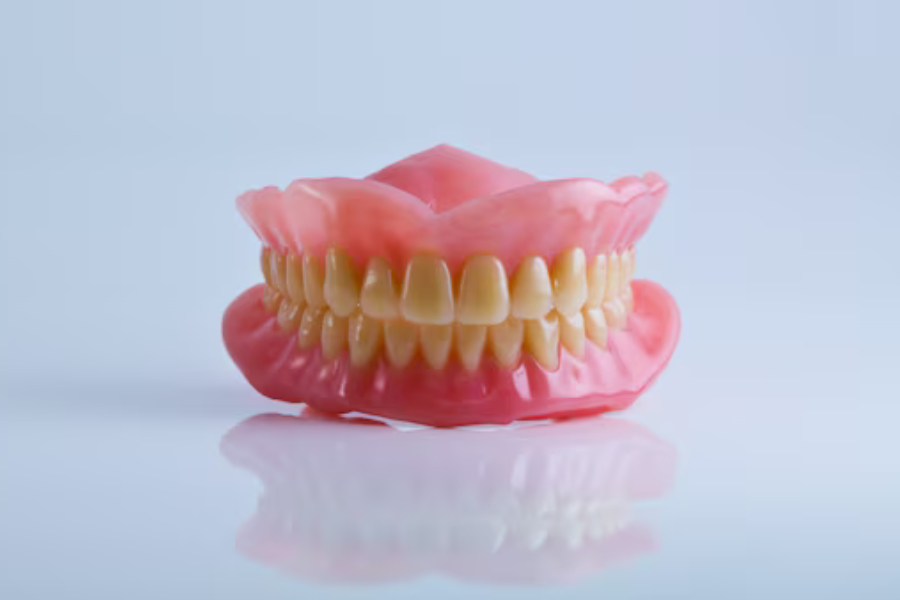
A beautiful smile enhances confidence and leaves a lasting impression. However, tooth loss can affect your ability to smile confidently. Dentures provide an effective solution to restore both the appearance and functionality of your teeth. Whether you’re missing one tooth or an entire arch, choosing the right dentures can significantly improve your quality of life. This ultimate guide will help you understand the different types of dentures, their benefits, and how to select the perfect fit for your smile.
Types of Dentures
When choosing dentures, it’s essential to know the available options and their unique characteristics. Below are the primary types of dentures to consider:
- Full Dentures
Full dentures, also known as complete dentures, replace all the teeth in either the upper or lower arch. They are typically made of acrylic resin and are held in place using suction or denture adhesive.
Benefits:
- Affordable and widely available
- Restore functionality and aesthetics
- Suitable for individuals with extensive tooth loss
Considerations:
- May take time to adjust to
- Require regular maintenance
- Partial Dentures
Partial dentures are designed for individuals missing some teeth but still have natural teeth remaining. They typically consist of a metal framework with artificial teeth attached.
Benefits:
- Preserve remaining natural teeth
- Easily removable for cleaning
- Provide a cost-effective solution for partial tooth loss
Considerations:
- Require proper fit to prevent discomfort
- Regular adjustments may be needed
- Implant-Supported Dentures
Implant-supported dentures are anchored to dental implants placed in the jawbone. These dentures offer increased stability and functionality compared to traditional options.
Benefits:
- Superior stability and comfort
- Improved chewing efficiency
- Prevent bone loss in the jaw
Considerations:
- Requires a surgical procedure to place implants
- Higher initial cost
- Immediate Dentures
Immediate dentures are provided on the same day as tooth extraction. They allow patients to leave the dental office with a complete set of teeth immediately after the removal of natural teeth.
Benefits:
- Immediate restoration of appearance
- Protects gum tissues during healing
Considerations:
- May require adjustments as gums heal
- Temporary solution until permanent dentures are made
- Snap-In Dentures
Snap-in dentures are a type of removable denture that “snaps” into place using attachments on dental implants. They offer a secure fit and are easy to remove for cleaning.
Benefits:
- Excellent stability
- Easy to maintain
Considerations:
- Requires implants for support
- Costlier than traditional dentures
Factors to Consider When Choosing Dentures
Selecting the right dentures involves more than choosing the type. Here are key factors to consider:
- Comfort and Fit
Comfort is crucial when choosing dentures. Poorly fitted dentures can cause discomfort, irritation, and difficulty in speaking or eating. A professional fitting by a dentist is essential to ensure optimal comfort and functionality.
- Material
Dentures can be made from various materials, including acrylic, metal, and porcelain. Each material has its pros and cons:
- Acrylic: Lightweight and affordable but less durable.
- Metal: Durable and long-lasting but heavier.
- Porcelain: Offers a natural appearance but can be brittle.
- Appearance
The appearance of your dentures can affect your confidence. Modern dentures are designed to look as natural as possible. Discuss your preferences with your dentist to ensure your dentures match your natural teeth’s color and shape.
- Durability
The durability of dentures depends on the material used and how well they are maintained. Implant-supported and metal-based dentures tend to last longer than acrylic options.
- Cost
The cost of dentures varies depending on the type, material, and additional procedures required. While implant-supported dentures may have a higher initial cost, they offer long-term value due to their durability and stability.
- Maintenance
Proper maintenance is essential to prolong the lifespan of your dentures. Regular cleaning, proper storage, and routine dental visits are necessary to keep your dentures in good condition.
How to Care for Your Dentures
Taking care of your dentures is essential for maintaining oral health and ensuring they last longer. Here are some tips for proper denture care:
- Daily Cleaning
Clean your dentures daily using a soft-bristled brush and denture cleaner. Avoid using regular toothpaste, as it can be abrasive and damage the dentures.
- Soaking
When not in use, soak your dentures in a denture-cleaning solution or water to prevent them from drying out.
- Avoid Staining Foods and Drinks
Limit your consumption of coffee, tea, and other staining beverages to keep your dentures looking their best.
- Handle with Care
Dentures can be fragile, so handle them with care to avoid accidental drops and breakage.
- Regular Dental Checkups
Visit your dentist regularly to check the fit and condition of your dentures. Your dentist can make necessary adjustments to ensure comfort and functionality.
Signs You Need New Dentures or Adjustments
Over time, your dentures may need to be replaced or adjusted. Here are signs that it’s time to visit your dentist:
- Difficulty chewing or speaking
- Soreness or irritation in the gums
- Loose or ill-fitting dentures
- Cracks or damage to the dentures
Conclusion
Dentures are a valuable solution for restoring your smile and improving your quality of life. With various types available, it’s important to understand the options and factors to consider when making your decision. By choosing the right dentures and maintaining them properly, you can enjoy a beautiful, confident smile for years to come.